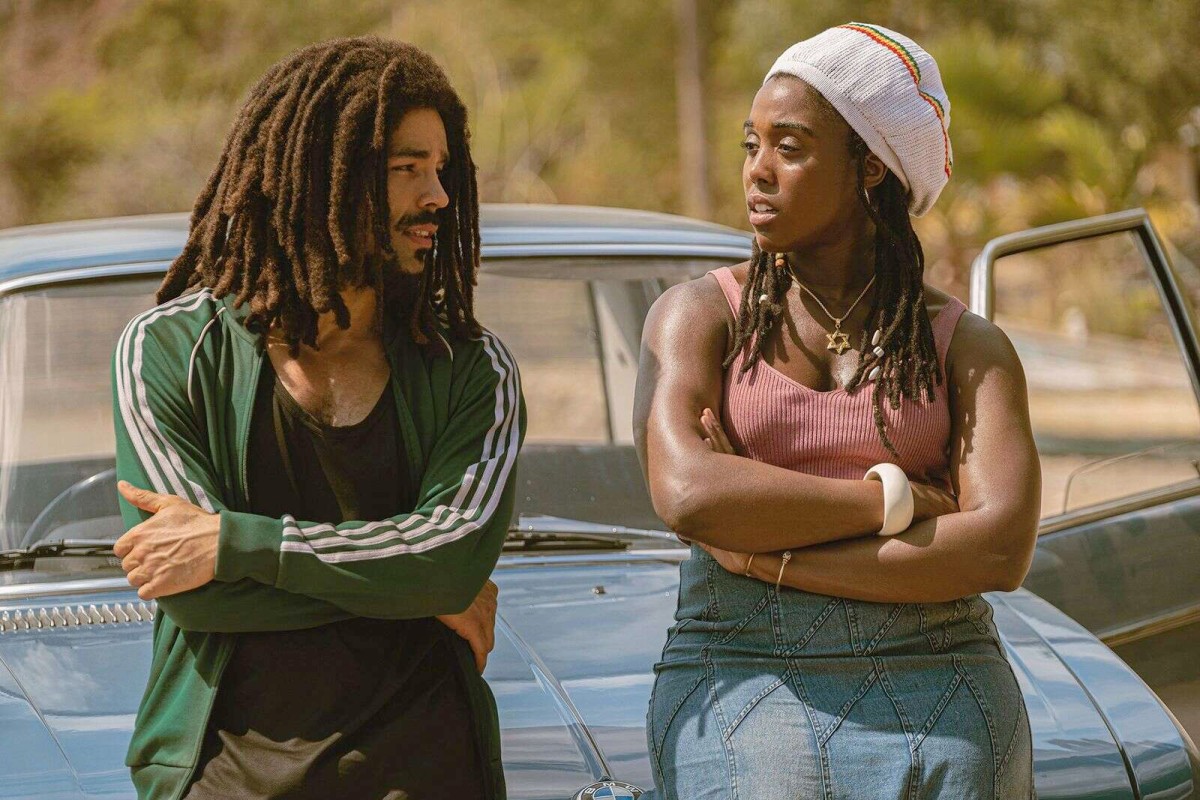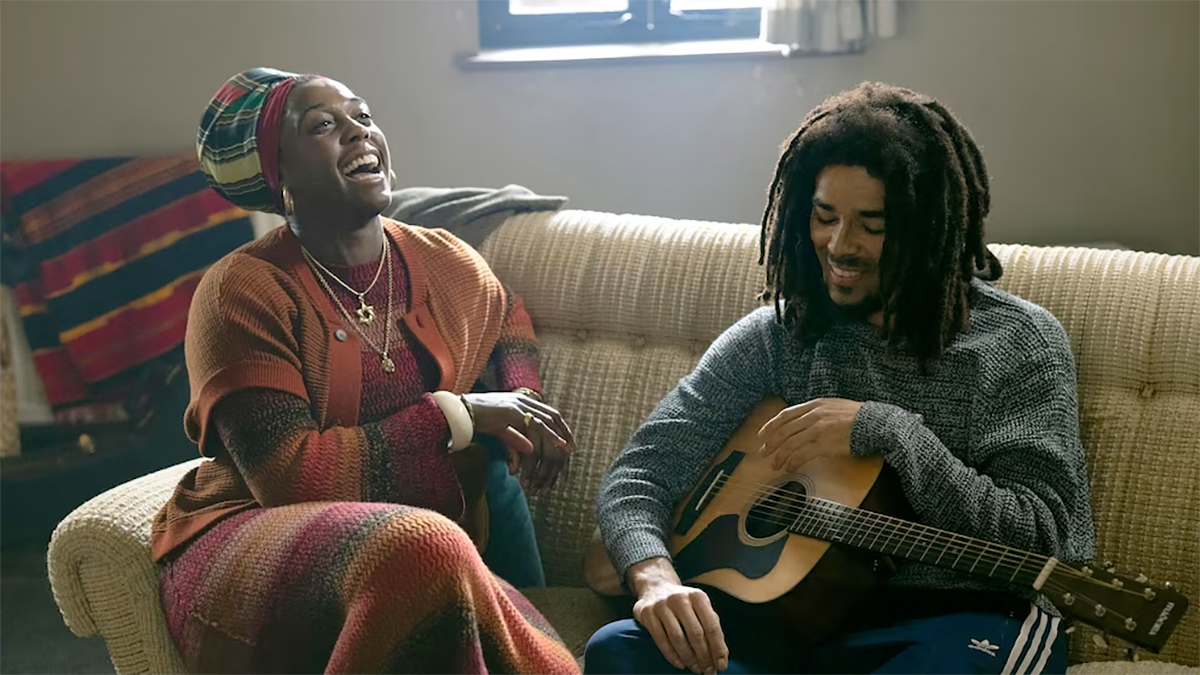‘Bob Marley: One Love’ Biopic Attracts Poor Reviews From Critics Ahead Of Release

Paramount Pictures’ Bob Marley: One Love biopic has attracted a wave of underwhelming reactions among film critics. However, lead actors Kingsley Ben-Adir and Lashana Lynch have received commendations for their performances, which most reviewers say capture the essence and spirit of Bob Marley and his wife Rita with authenticity and finesse.
Rolling Stone‘s David Fear described the film as a “perfectly functional look at the musical legend” but insists that it “never really catches a fire.” The publication praised Ben-Adir for having “clearly put in the work” and hailed Lynch as “underused and one of the greatest actors of her generation.”
According to the critic, the biopic showcases Marley as a father, husband, artist, spiritualist, doubter “and ultimately, Bob the icon,” but fails to showcase his “soul rebel” side, although it was “not for lack of trying, of course, especially on Ben-Adir’s part.”
Fear even noted that there was “a weird distance” taking place with Marley and the rest of the film, “even at its most energetic” it appeared “as if this was a biopic that happened to feature the Reggae musician as opposed to a movie centered around Bob circa ’78”.
“More likely, the main culprit is the format. Bob Marley: One Love keeps bumping its head against the ceiling of the genre, sticking to a music biopic formula even as it gently tweaks it,” he added.

The Associated Press‘ Jake Coyle, who gave the film two stars out of four, described it as “a noble but uninspired attempt to capture some of the essence of Marley”. He added, though, that “its lived-in textures and attention to Marley’s political consciousness, just by themselves, are enough to make “One Love” something more substantial than many recent, glossier music biopics”.
While Ben-Adir was again hailed for his skills and even for his accent by the writer, who noted that he had the “growl and lilt” of Marley’s “resonant Jamaican accent,” the critic also noted that the British national’s performance did not have “the physical dynamism and charismatic velocity of Marley.”
“One Love appears to have wrestled with finding a single portrait, and the movie’s patchwork pacing occasionally shows signs of that struggle,” he wrote.
Variety’s headline was not favourable. It read: “Bob Marley: One Love’ Review: Kingsley Ben-Adir Inhabits the Reggae Legend in a Music Biopic That’s Anything but Revolutionary,” noting that the film “misses the catharsis of Marley’s rise.” Owen Gleiberman wrote that “on paper, one understands why this period of Bob Marley’s life might seem fertile for filmmakers” but, nevertheless, went on to state that the film turned into “a rambling and rather haphazard mid-’70s hang-out movie.”
Gleiberman also hailed Kingsley Ben-Adir as ‘inhabiting’ Marley with the finesse of a movie-star showman from the get-go, and lead actress Lashana Lynch as “the movie’s most grounded character”. However, he noted that the film was “as problematic as it is provocative” and that by limiting itself to the period of 1976-1978, “the film shows us almost nothing of how Marley rose up in Jamaica and helped to forge the inside-out-rock-‘n’-roll form of reggae, building on its roots in ska and rocksteady and R&B.”
“Given that this is Hollywood’s first major reggae biopic, what we yearn to see is how reggae took off and gained power as an art form. That the film treats all this as ancient history, turning songs as incendiary as “Get Up, Stand Up” into generic needle drops, is baffling and weirdly unsatisfying,” he wrote.
In his final words, the critic said that except for the scene in which Marley violently attacks his manager for trying to milk an African tour for profit, “the Marley we see is close to a saint.” According to him, the biopic “flirts with complexity but slides into the banality of hero worship.”
With Marley’s family on board, this officially-approved life story serves up the hits but skirts some big questions, The Guardian‘s Peter Bradshaw wrote in his review.
Noting that the film appeared “unrelaxed and sanctified”, the critic wrote that “biopics don’t get more authorised or anaesthetised than this ploddingly solemn account of reggae legend Bob Marley.”
“A great, or good, movie could have been made about Marley’s sensational career, his musical genius, inspirational asceticism (if not quite humility) and poignant sacrificial destiny as someone who drove himself unsparingly through illness to create a free concert for peace and unity in Jamaica in 1978.
The reviewer also described the assassination attempt on Bob as “the most boring attempt at a killing that I’ve ever seen on screen. It’s as if the movie is already looking forward to Marley’s imagined saintly forgiveness for his would-be killer.”
“This is a vacuum-sealed package of fan-orthodoxy that never takes off. The euphoria and uplift aren’t there,” he noted.
He also took issue with the fact that the film “just about acknowledges Bob’s extramarital indiscretions and paternities, although this is something sternly mentioned in order to be swept away as if entirely irrelevant.”
The Hollywood Reporter hailed Ben-Adir and Lynch for ‘enlivening’ what it described as a “stunted biopic.” According to the publication, while One Love emphasizes Marley’s role as an unlikely peace broker in post-colonial Jamaica, the film “doesn’t fully engage with what that means.” Additionally, it noted that while it acknowledges Marley’s concerns with the country’s escalating political violence in the ’70s, it “shies away from exploring the collective psychic scars of that domination or the realities of a nascent national project.”
“Part of the problem with Green’s film is how incurious it seems about one key reason for the musician’s popularity: that Marley’s messages — about Pan-African unity, love and equality — were beacons for a generation of Black people emerging from colonial oppression,” it noted.
Ben-Adir again attracts praise for his performance, which is described as “finely tuned,” “conjures Marley’s charisma” and “captures the mystical relationship between Marley and his music as well as his kinetic stage presence”.
But The Hollywood Reporter also lamented the film circumventing what it described as the more complicated threads of Bob’s life “notably the extramarital affairs that made him a father to 11 children — by offering other female figures just brief appearances” wherein “their faces flash across the screen as Marley makes himself at home in London, and later as he tours throughout Europe facing rapturous crowds.”
The Gleaner’s review of the movie was highly favourable. Describing it as “a film fit for a legend” in the headline, the newspaper’s critic Damian Levy, noted that the biopic was “the real deal” and gave it a rating of “Big Screen Watch”.
The lead actor is also hailed for his performance, with the critic noting that “whether he’s affable or assertive, Ben-Adir is completely believable”, with his emotional state “conveyed in the tone of his voice and his body language”.
Ben-Adir he said, irrespective of the emotion, “plays the icon with pathos, in a performance that’s grounded in reality and a solid accent to boot”.
Unlike the other critics who took issue with the progression of the movie and the omission of matters they considered critical to a Bob Marley biopic, the Gleaner noted that “the balance that’s struck between several aspects of Marley’s life is solid, as is the movie’s grasp of humour and drama.”
“The decision to focus on a singular period in the life of Bob Marley pays off greatly, resulting in a film that’s well paced. Its narrative styling of events creates just enough drama to be captivating, without losing its sense of authenticity. It’s a film that tries to be many things at once and manages to pull it all together in an inspiring and epic story,” the publication’s critic noted.
The film, which also stars several Jamaican artists, will hit theatres on February 14.

